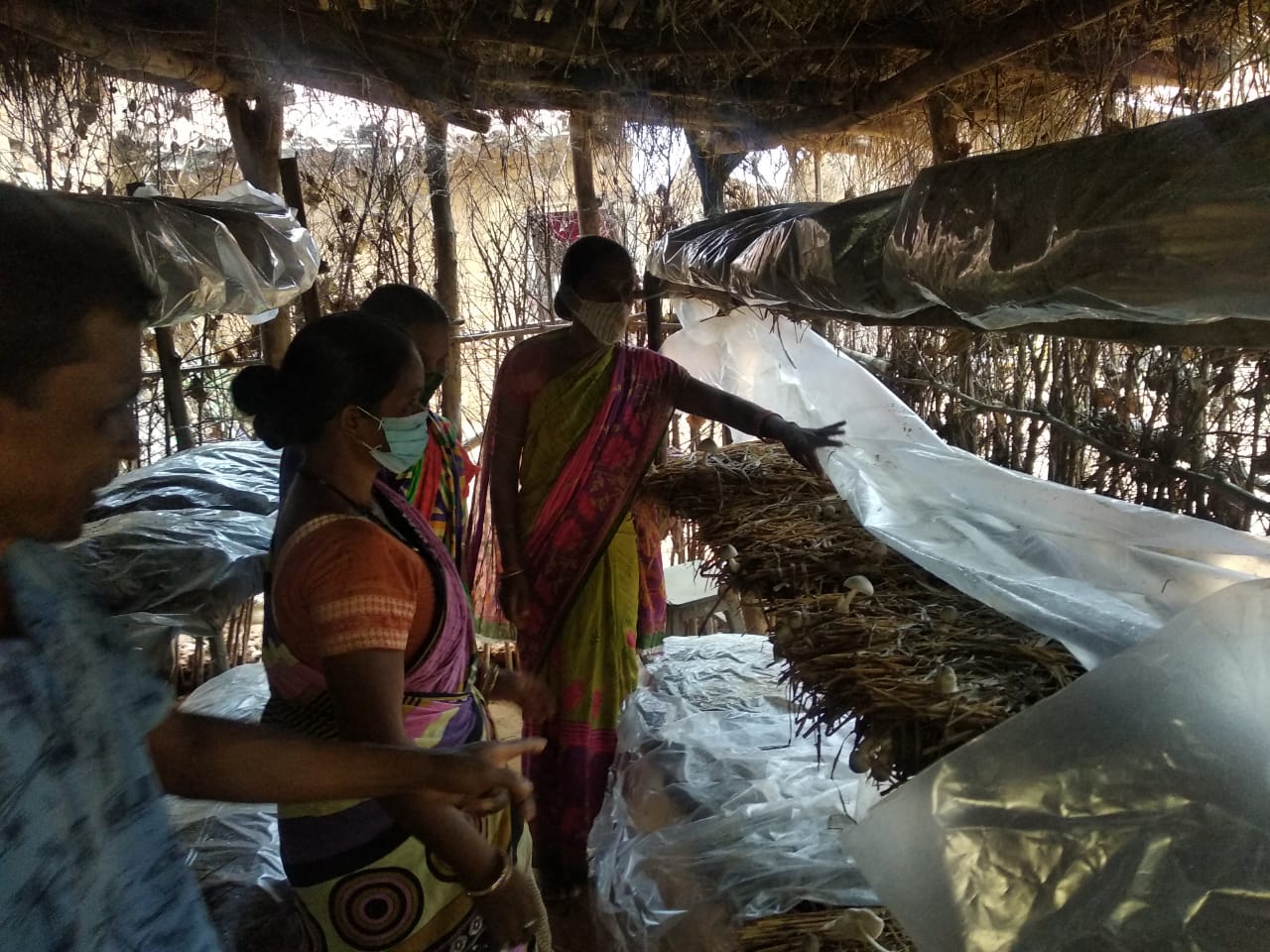Cultivating paddy-straw mushroom to tide over income crisis
StoryBy Chandrika Patnaik
3 October 2021
Self-help groups farm easy to grow paddy straw mushrooms to earn additional income and ensure nutritious diet for their families during the pandemic.

Members of the three SHGs take up mushroom farming to supplement their family's income.
Photograph by Bibhuti Patra
Members from self-help groups (SHGs) in Colonypada village in Lakhanpur block of Jharsuguda district have been harvesting two kilograms of mushrooms and earning ₹200 every day since July 2021. Gram Vikas facilitated three SHGs in the village Grama Devi-A, Grama Devi-B, and Maa Mangala, to start joint production of paddy straw mushrooms as an alternative sustainable source of income during times of distress.
The women typically work with their husbands on their land to cultivate vegetables. They sell these at the local market earning approximately ₹1000 every week. The COVID lockdown allowed only a few hours of sales on weekdays, and there was a complete shutdown during the weekends. Women sold most of the vegetables at low prices; some lay unsold, and the remaining vegetables rotted in the fields.
Kalyani Adha, a member of Gram Devi-A SHG, says, “I work as a farmhand where my husband grows vegetables and paddy. We faced losses in April-June 2021 during the lockdown in our district. The vegetables we grew rotted on the fields and we lost all the money we invested. With no other means of income, we faced a lot of hardships during that time.”
Members of the three SHGs in the village were encouraged to take up mushroom farming to supplement their family’s income. Paddy straw mushroom grows in readily available farm residue. The mushroom can be grown inside the house without needing a separate space. Initially, each group invested ₹2000 from the group savings to buy inputs like a water spray machine and a straw cutter.
In June 2021, the three groups attended the training programme organised by Mission Shakti with the support of Vana Suraksha Samiti and TRL Krosaki Refractories Ltd at the Lakhanpur panchayat office. During the 10-day training period, the women learnt to prepare mushroom beds, the optimum moisture required for the spawn and a favourable time to harvest the mushrooms. Women received spawn and polythene. Soon after the training, Mission Shakti provided financial support of ₹47,000 for each group in instalments.
Subhasini Adha, a member of Grama Devi-A SHG who underwent the training, says, “The training was extensive. We started the cultivation in the third week of June. In July, we sold the first lot of mushrooms we grew. It is convenient to grow inside four walls. Also, the market for mushrooms is very good. People from our village and nearby areas come and pick it up. Since mushrooms are nutritious and a good protein source, we cook them regularly for our children these days. During such times like lockdown, mushroom cultivation is a good alternative source of income.”
Paddy straw mushroom bed inside the thatched house.
Photograph by Bibhuti Patra
ACKNOWLEDGEMENT
Reporting by Sibaram Sahu and photographs by Bibhuti Patra. Ganesh Chakaravarthi edited the story.
ABOUT THE AUTHOR
Chandrika Patnaik leads on content production in the Communications team.
RELATED BLOGPOSTS
No school nearby, so they built one themselves
Facing distance and neglect, Adivasi families in Odisha built their own tuition centre for children.
Turning canal overflow into crop success
Small farmers unite to secure water and improve crop yields with a check dam.
When the rains took their goats, they found a way to rebuild
In a village in Odisha, Keshab and Pramila’s goat shed brought healthier animals, steady income, and a model others want to learn from.